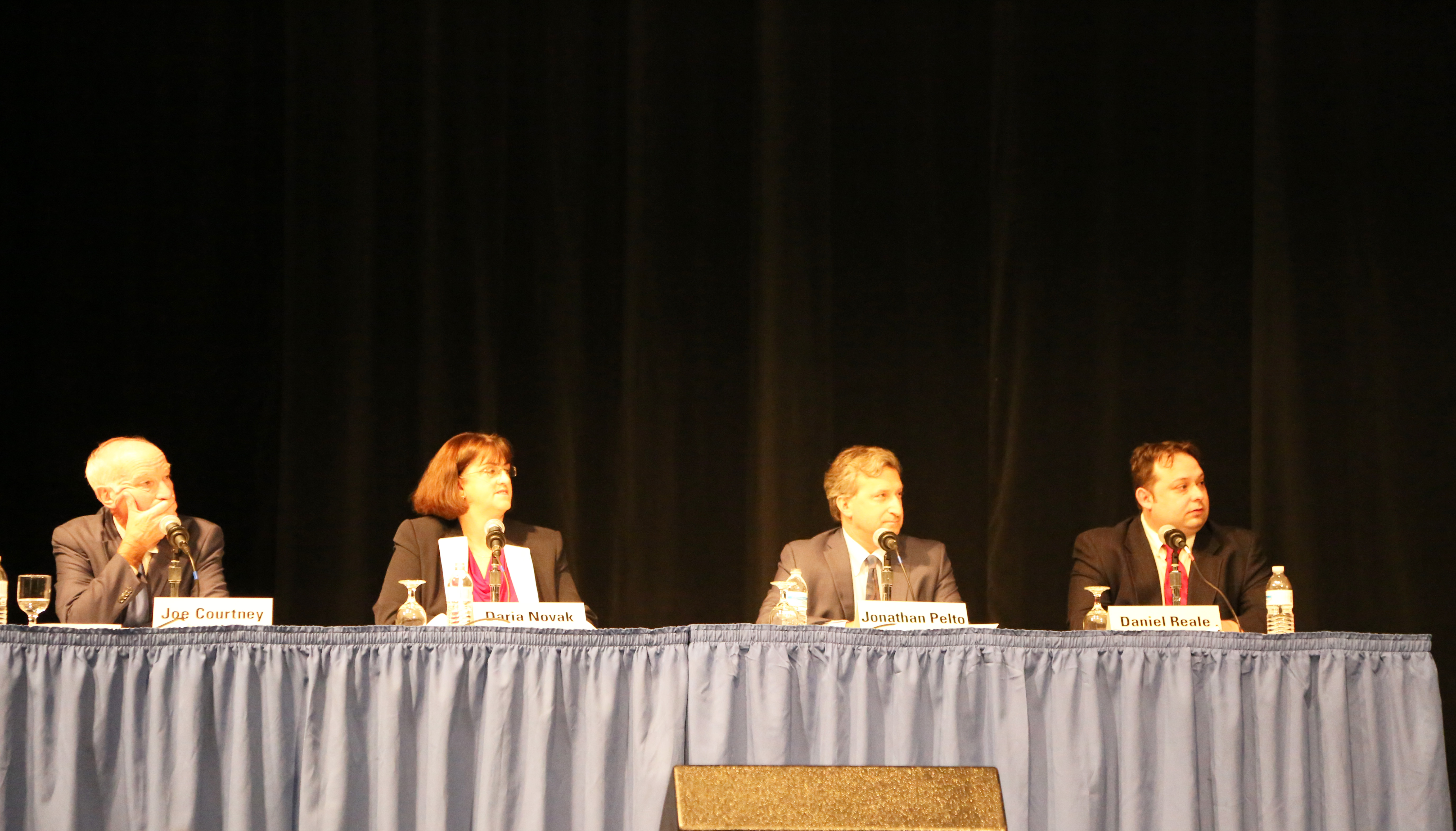The political climate in our country this year has been especially fascinating. From government majors, like myself, to people with no previous interest in politics, this election season has proven compelling. The presidential election has been so attention-grabbing that people have tuned in to the presidential debates at record-setting numbers. Keeping this in mind, Connecticut College itself recently hosted a Congressional debate. On Tuesday, Oct. 25, the four candidates running in the 2nd Congressional District of Connecticut convened on campus for a debate moderated by Paul Choiniere, Editorial Page Editor, and Defense/Military Reporter Julia Bergman, from The Day. The debate was held in Palmer Auditorium from 7:30-9:00PM. Students from Conn and the Coast Guard Academy submitted questions to the candidates.
As a student in two U.S. government-focused classes and a political science enthusiast, I genuinely looked forward to observing the debate. During the week before the debate, several of Prof. Borrelli’s government classes brainstormed numerous questions to submit to The Day for consideration. Students were assured by Prof. Borrelli that, although the questions would be edited and rephrased, they would be considered and incorporated into the debate. Questions were inspired by a number of factors including the identities of the candidates, current national issues and current local issues.
A quick note about each of the candidates- the candidate for the Democrat Party is Joe Courtney, who has held the position since 2007. The length of his incumbency inspired questions about the progress that has been made during his tenure and what remains to be accomplished. The Republican candidate is Daria Novak, who is vocal in her support for presidential candidate Donald Trump. Her background as a divorced mother of two sparked interest in connections between the candidates and their respective opinions on the presidential election during the classes’ question-brainstorming process. The Green Party candidate is Jonathan Pelto, who has served in the CT legislature but is also established in the private sector as a communications strategist and blogger. Finally, the Libertarian candidate is Daniel Reale, who ran unsuccessfully against Joe Courtney in 2014.
Prior to the debate, I felt that political topics of interest to students at Conn had relevance both in the national and local spheres of government. However, the general consensus that I gathered from class discussions following the debate is that most of those interests were not represented or acknowledged during the debate. It is somewhat difficult to decide upon whom the responsibility for the debate’s failures lies. On the one side, The Day was in charge of deciding which questions would be asked. On the other, candidates were aware that their debate was taking place on a college campus. Regardless of which party bears the greatest responsibility for the shortcomings of the debate, both failed to reach us.
Topics covered included climate change, health care, the Opioid epidemic, the defense industry, refugee resettlement, submarine building, undocumented immigration, student loans, Common Core and Medicare. While all of these are extremely important issues, only about 4/10 were related to questions asked by Conn students. Topics not covered included policies related to police brutality, sexual assault, gun ownership and women’s rights and issues. While there was a 90-minute time constraint, it seems inappropriate not to address issues that have policy implications for both Conn students and the constituency of Connecticut’s 2nd Congressional District.
The disregard for these topics is unfortunate, regardless of whether the fault of these omissions lie with The Day or the candidates themselves. Defense and military issues are important to cover, but on a college campus certain issues carry more salience than others. For example, recent events on campus have brought the issue of police brutality to the forefront of students’ minds. Issues surrounding police brutality have also been emphasized within the national context for quite awhile now. The lack of a discussion concerning this issue, which is relevant on our campus, in the local community, and nationwide seems like an unfortunate oversight by both The Day and the candidates. Furthermore, this disconnect between audience and on-stage actors makes me wonder what the real point of hosting the debate was. Is the college just a convenient venue, or does conducting the debate on campus signify students as the target audience?
Prior to the debate, I felt it was an honor to be included in the local political process. However, the debate has left me feeling uninspired and more cynical about our political process. It has also made me consider whether we, as mostly transplanted students who will only be living in this community for four years, share political priorities with residents of the 2nd Congressional district. Further, as students, how do our political priorities align with those not in our demographic?
Many on-campus advocate for increased engagement between Conn and the New London community. We are supposed to avoid being trapped inside the “bubble” by engaging with the local community. Through local engagement we can link our own experiences to those outside of campus and develop a better understanding of certain issues. In relation to politics, local engagement can prepare us to enter the world as informed citizens who are able to set a meaningful agenda for our government. Hosting this debate, posing questions to candidates and evaluating candidates’ performances ideally could have been a great opportunity to engage with the local community and compare how our interests and concerns aligned with the candidates’. However, I feel that many of our interests were overlooked, reflecting our position as outsiders of the community. I am left wondering whether, as college students, we may develop shared political interests with the community that we live in. Additionally, as a senior, this experience has made me consider how I will be confronted by similar situations after graduation. Realistically, how will I personally try to have my political priorities represented?•










